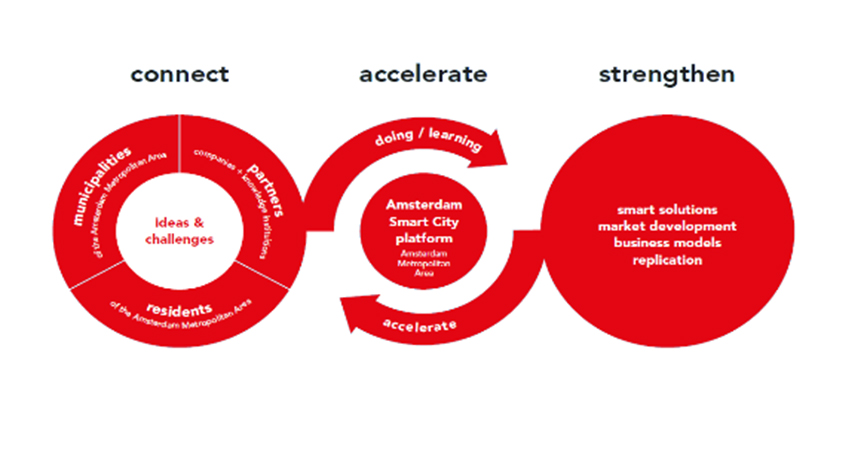Not too far into the future, many of us will live in smart cities, where technology and data will combine – proving that data insight is a driving force for growth and innovation. This and more was explored at the recent Webit 2017 in Sofia. The GMA attended and here we sum up the fascinating data driven perspective from that event.
This year’s Webit Conference was everything I expected and more. From the inspirational and informative to the frankly bizarre, I certainly went home filled with ideas and having had more interesting conversations than I can count.
With more than 5,000 attendees, the Webit Festival is now a mainstay on the European marketing and technology calendar and a driving force for growth and innovation in the CEE region. That status was reflected by the President of Bulgaria, the ex-President of Bulgaria and the Mayor of Sofia all on stage to welcome us to Sofia and by the level of speakers supporting the event generally.
So, to the detail:

Michael Paustian: “Focus on data.”
The GMA’s focus was on uncovering the data driven side of the conference and, as you would expect, it was a topic that came up frequently across almost all the 12 content streams that were running. As Michael Paustian (pictured right), creative director and head of Strategic Product Development at Axel Springer, said during his talk: “Focus on data, then data and, finally, more data.”
Data driven insight
There were plenty of data driven companies and products on show, but the big theme for me was about how to get from data to actionable insight.
The consensus was that most companies didn’t have the capability to use data effectively (at the GMA, we define capability as having all the parts in place to execute not just some expensive tools that make you feel like you’re doing something) Here’s three reasons why, according to the Webit speakers, so many companies can’t execute a functional data strategy:
-
- Insight takes expertise. Businesses have been trying to shortcut hard work by buying shiny new tools. As the saying goes, ‘rubbish in, rubbish out’. Companies must understand they need expertise across the data value chain. How do we get good, clean data in, how do we ask the right questions and, finally, how do we interpret the data into business insight? Beware the snake oil salesmen selling shortcuts!
- Culture trumps everything. Data is effectively a representation of business processes. Same processes, same outcome. Becoming a data-first company starts with thinking and acting like one. That means everyone, from the CEO to the intern, understanding why data matters and why it can drive service delivery, customer experience, supply chain efficiency and better marketing. As long as people think of data as a ‘record’ of a person or event, without context, you’ll struggle to use it effectively.
- The age of the machines is not yet here (although it is approaching fast). AI and machine learning requires a data layer to operate; it’s not just about being smart. The bigger issue is that everyone has jumped on the AI and machine learning bandwagon because it’s this year’s shiny new toy. Next time someone brings it up, ask them to explain the difference and how they work (including the different types of machine learning): 99 times out of 100 it will be a short conversation. That’s not to say you should ignore what’s happening. Things are moving fast and data driven technology like machine learning will have a very real impact in the coming years. Just ask hard questions before you jump in.

Nick Worth discussed the trade-off between data privacy and the personalisation of the online experience.
Staying on the topic of data driven insight, another Webit highlight was Nick Worth (pictured right) from Selligent’s talk on ‘Today’s Entitled Consumer: Meeting Her Demands’. One of his most interesting points was we must be careful about making assumptions on how people feel regarding the trade-off between getting a fantastic digital experience and data privacy.
He argued that this is not a one-size-fits-all answer and that it’s changing all the time. Older consumers generally value privacy first, although this is partially because they don’t understand that data is needed to drive the online experiences they do like. However, Millennials do understand that data should mean a better experience and don’t care about privacy as long as you deliver the experience they expect. But be aware that if you get it wrong, you may well be saying goodbye to them forever.
A final note on this topic – one speaker advised listeners who were beginning their marketing career to become data scientists, such was the shortage now and the likely demand in the future. I couldn’t agree more.
Running on data: smart cites
Many of you might question the relevance of smart cities for data driven marketers, but I found this to be one of the most interesting streams at Webit, as its speaks to most of our futures and will certainly have long-term implications for marketers.
Let’s not forget we need smart cities: 50% of the world’s population will live in cities by 2030. This is the future of the human story, they are the economic drivers for most countries and they are where most innovation happens. However, what was most interesting was that to create smart cities we will need to have an effective data layer and to embrace the concept of API-driven service design (an open data layer that everyone can access and build services onto).
Of the many outstanding speakers, I was most taken by the speaker from Amsterdam Smart City (ASC), a city pioneering the ideas discussed at the conference. ASC has taken a bottom-up approach and enabled an open data platform that cities anywhere can use when developing smart city strategies.
The ASC speaker’s key message was we should resist making ‘patches’ of apps that, while offering quicker deployment, will inevitably lead to an unmanageable tangle (similar to those we see now in government IT services, for example). In reality, this means creating a data infrastructure layered over a physical infrastructure of connected devices that are already in place for other reasons. For example, deploying sensors that can be used by multiple applications attached to the lighting infrastructure, or bus shelters.
The long-term implications for marketers (and privacy) are considerable. Once we know where people are, where they have been, where they are going and even what mood they are in, our ability to target our messaging would be extraordinary.
There will be concerns about privacy and data of course but that won’t stop it from happening. As highlighted above by Nick Worth, the entitled consumer “expects” us to deliver relevant and even predictive marketing and services and that data and privacy concerns fade into the background as long as you deliver great value. It’s a sobering thought to think that in a smart city of the future I’ll get home from work to find a bottle of red wine opened (by my robot helper), a tasty takeaway waiting in the kitchen and my favourite TV programme teed up ready to go – all because the city had ‘sensed’ my mood that day.
However, as our speaker pointed out, care must be taken. Once you intertwine digital and power services to create a smart city, you can’t undo it. Smart cities will be driven by data and energy and whomever owns the data and power has the power to control the city. Sobering thoughts.
The good, bad and ugly of the start-up ecosystem
Away from the main stage, Webit also had a large start-up stream where more than 100 start-ups (selected from almost 2,500 that applied) competed for a 200,000 euro investment, as well as serenading the 150 investors in attendance and engaging with the other attendees.
The money went to CONELUM Biotech, deserved winners in my view, although there were some other very serious contenders that would have equally deserved the prize. My biggest takeaway, and as a start-up founder for our Drupal productivity platform (www.cohesion.co.uk) this was interesting to see, was the need for many of the start-ups to really focus on their proposition and their pitch. (We’ve been busy back at the office since I returned critiquing hard our go-to-market proposition and making sure we have it right.)
Some founders did an amazing job, but others floundered. It strikes me, and this is far from being an issue only for start-ups attending Webit, that most founders could do with more support on how to develop solid propositions, how to value their business and how to communicate publicly. I guess that’s the role of the many start-up accelerators that now exist, but not everyone will be accepted on those programs and it seems that some great ideas and talented people are going to fail for lack of these core skills.
Anyway, here are my personal favourite top 5 from the start-up hall:
There was a lot more going on at Webit than I can do justice to here, but hopefully this gives you a flavour. My biggest takeaway was that innovation is continuing to accelerate and that the CEE region is a major force in technology. I heard someone call Sofia the Silicon Valley of the East. Bold and perhaps premature, but things are certainly moving in that direction.
See you there next year, I hope.
Read also:
Agility, experimentation and culture change: what innovative start-ups teach brands
Future-proof your business: the strategic role of data in marketing









Leave your thoughts